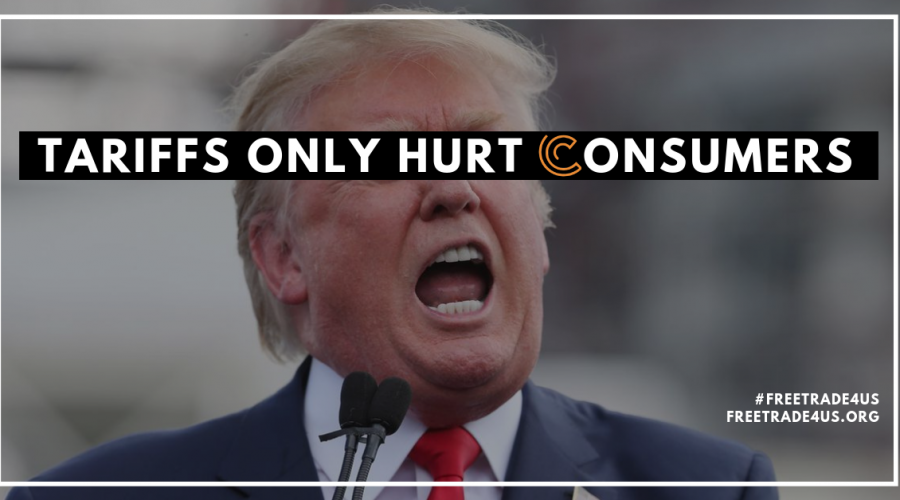Der neue Handelsboss ist dasselbe wie der alte Handelsboss
Präsident Biden legt großen Wert darauf, einen Kontrast zu seinem Vorgänger Donald Trump zu schaffen. Bezüglich der Zölle auf bestimmte Importe ist jedoch geplant, die Dinge mehr oder weniger beim Alten zu belassen.
Aktuelle Berichte deuten darauf hin dass die Biden-Regierung chinesische Waren im Wert von $300 Milliarden bewertet, die Trump mit Zöllen belegt hat Abschnitt 301 des Handelsgesetzes von 1974. Die Verbraucher werden die Kosten tragen, wie sie es bei protektionistischen Maßnahmen immer tun. Und es scheint egal zu sein, welche Partei die Verbraucher wählen.
In den Vereinigten Staaten hat sich die Inflation allmählich abgeschwächt, was den Verbrauchern die dringend benötigte Erleichterung verschaffte Im Jahr 2022 kam es zu Rückgängen bei den Haushaltseinkommen aufgrund höherer Preise. Die Abschwächung der Inflation hat Biden seiner Meinung nach politischen Spielraum gegeben, um China beim Handel weiter zu drängen, was sein Image bei den Wählern als hartnäckig gegenüber einem ausländischen Rivalen gestärkt hat.
So soll eine freie Marktwirtschaft nicht funktionieren. Ein Wahljahr sollte nicht zu höheren Verbraucherpreisen für ausgewählte Waren führen, die nicht auf der Nizza-Liste des Präsidenten stehen. Elektrofahrzeuge mit chinesischen Komponenten und mineralischen Produkten werden künstlich teurer bleiben, wenn die Zölle anhalten, und es könnte sogar zu einem Anstieg kommen, wenn Biden sich dazu entschließt, die Schrauben noch fester anzuziehen.
Es ist ein rätselhafter Schritt für eine Regierung, die den Kampf gegen den Klimawandel als Amerikas wichtigstes Gebot der nationalen Sicherheit angepriesen hat, da Zölle auch die Preise für saubere Energietechnologie in die Höhe treiben werden. Die Verbraucher werden in Scharen auf Elektrofahrzeuge umsteigen wenn der Preis stimmt und die Zuverlässigkeit stimmt der Technologie nimmt zu.
Zölle werden auch zu Störungen in einer bereits krisengeschüttelten globalen Lieferkette beitragen. Militäreinsätze gegen vom Iran unterstützte Huthi-Piraten im Roten Meer sprengen weltweit die Logistik von Handelsschiffen. Ungefähr 30 Prozent der weltweiten Containertransporte werden über den Suezkanal transportiert, und das Sicherheitsrisiko hat die Transportzeiten verdoppelt und wird wiederum die Verbraucherpreise in die Höhe treiben.
Der Zusammenbruch der diplomatischen Beziehungen und der militärischen Vormachtstellung in strategischen Regionen wie dem Roten Meer oder dem Südchinesischen Meer bleibt für die Amerikaner und ihren Geldbeutel nicht ohne Folgen.
Forschung aus dem Amerikanisches Aktionsforum Im Jahr 2023 wurde festgestellt, dass die Kosten der Zölle seit der Einführung durch Trump in Höhe von $48 Milliarden an die Verbraucher weitergegeben wurden. Dass Biden diese Politik wissentlich fortführt, um bei den Chinesen hart zu punkten, ist eine Beleidigung für jeden Amerikaner, der darum kämpft, mit den Lebenshaltungskosten Schritt zu halten.
Anstatt auf höhere Zölle zurückzugreifen, konzentriert sich die Biden-Regierung darauf, die Geschäftskosten der inländischen Industrie in Amerika zu senken. Pauschalzölle bewirken kaum mehr, als größere wirtschaftliche Probleme unter den Teppich zu kehren, damit die nächste Regierung sie entdecken kann. Das Problem mit dem Dreck unter dem Teppich besteht darin, dass der Nächste ihn wahrscheinlich nicht aufkehren wird und die Verlierer die amerikanischen Verbraucher sind.
Ursprünglich veröffentlicht hier







